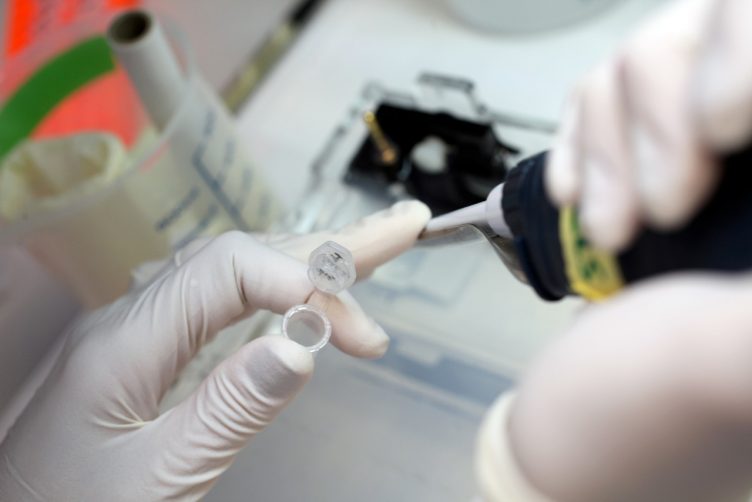This website uses cookies so that we can provide you with the best user experience possible. Cookie information is stored in your browser and performs functions such as recognising you when you return to our website and helping our team to understand which sections of the website you find most interesting and useful.
 Laboratorio del CNIO./CNIO
Laboratorio del CNIO./CNIO
The results of the ELARA trial show that therapy is effective against follicular lymphoma
The BELINDA trial is studying the application of this therapy to diffuse large B-cell lymphoma. It is one of the first phase III trials for immunotherapy using CAR-T cells, although it currently offers no improvement over conventional treatment
“We are drawing up alongside other European countries in the development of CAR-T therapies,” says Joaquin Martinez, head of the H12O-CNIO Haematological Malignancies Clinical Research Unit
Immunotherapy with CAR-T cells is one of the biggest recent advances in cancer treatment, although for now it has only been approved for use in patients with certain haematological tumours who have not responded well to previous treatments. Researchers from CNIO and Hospital 12 de Octubre have participated in two international trials that will help to expand the indications of this therapy, and the results of which have been published in Nature Medicine and theNew England Journal of Medicine.
As haematologist Joaquin Martinez, director of the H12O-CNIO Haematological Malignancies Clinical Research Unit, explains, the fact that Spanish hospitals and research centres are collaborating significantly in these trials means, above all, that “we are drawing up alongside other European countries in the development of CAR-T therapies”.
The new trials are focusing on tisagenlecleucel, currently approved for the treatment of some second-relapse patients with diffuse large B-cell lymphoma and relapsed childhood lymphoblastic leukaemia.
The ELARA trial shows that this therapy is also “effective and safe” against follicular lymphoma, the authors write in Nature Medicine.
The BELINDA trial is focusing on diffuse large B-cell lymphoma. Together with the ZUMA-7 trial – which uses the drug axi-cel to fight the same lymphoma– this is the first phase III trial for CAR-T therapy, in other words, its aim is to study whether the new treatment is safe and works well compared to the standard protocol in patients with first-relapsed lymphoma. Participants are randomly assigned to separate groups, allowing for more impartial analysis of the results. The findings from the BELINDA trial, published in the New England Journal of Medicine, in principle show no improvement over conventional treatment.
Both studies have been promoted by Novartis Pharmaceuticals Corporation, the manufacturer of tisagenlecleucel.
Ultra-personalised therapies
The application of CAR-T lymphocyte immunotherapy requires specific experience and expertise. It is a personalised therapy that involves an autologous transplant of T-lymphocytes, one of the types of cells that make up the immune system.
Specifically, the patient’s own T lymphocytes are genetically modified to strengthen their ability to fight the tumour. The modification takes place outside the body: Lymphocytes are removed, manipulated, and cultured in the laboratory, and finally infused into the patient, like an ultra-personalised medication.
Genetic modification causes T lymphocytes to recognise a type of molecule present in cancer cells, specific to each type of cancer; the modified T lymphocytes target tumour cells and destroy them. Around 15 Spanish hospitals are already accredited to administer CAR-T immunotherapies, approved for the first time in Spain in 2018.
Good results for CAR-T in follicular lymphoma
Follicular lymphoma usually has a good prognosis, but around 20% of patients relapse and do not respond well to treatment. The ELARA trial recruited more than a hundred patients from different countries to study the efficacy and safety of using CAR-T therapy with tisagenlecleucel in adult patients with follicular lymphoma who relapsed after being treated two or more times and whose prognosis is poor.
The first analysis shows that it is an “effective therapy” with a good safety profile even for high-risk patients. The results “are promising; the potential long-term benefits should be evaluated with longer-term studies,” write the authors in Nature Medicine.
“The clinical benefit observed is high, with low toxicity,” says Martínez.
Need for more evidence against diffuse large B-cell lymphoma
The the H12O-CNIO Haematological Malignancies Clinical Research Unit is also involved in the BELINDA trial, which tests the same CAR-T therapy in diffuse large B-cell lymphoma.
The use of tisagenlecleucel had already been approved for this disease, but only after a phase II trial without a comparison branch and for patients who have relapsed after two previous third-line treatments. The BELINDA trial is studying its application in patients following their first relapse and has found no improvement over standard treatment.
However, the aforementioned ZUMA-7 trial with another CAR-T in the same indication, published in the same journal, has seen positive results. “These studies should be continued in order to explore possible regulatory agency approval of CAR-T therapies in diffuse large B-cell lymphoma,” Martínez concludes.
Reference articles: Second-Line Tisagenlecleucel or Standard Care in Aggressive B-Cell Lymphoma. Michael R. Bishop et al. (New England Journal of Medicine). DOI:10.1056/NEJMoa2116596
Tisagenlecleucel in adult relapsed or refractory follicular lymphoma: the phase 2 ELARA trial. Nathan Hale Fowler et al. (Nature Medicine). DOI: 10.1038/s41591-021-01622-0
